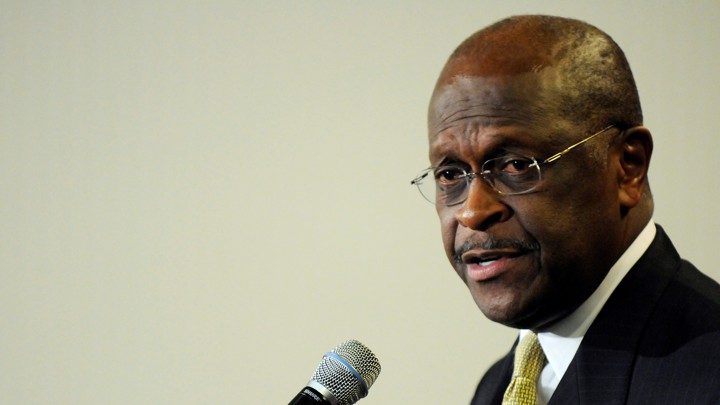Trump Goes Beyond Cronyism—To Something Far Worse
If Herman Cain and Stephen Moore are confirmed to the Federal Reserve, it would hardly be the first time that unqualified people ended up in positions of national importance. It is a fact of political life that all governments, of every kind, are infested with hacks and cronies. Indeed, in the United States it is something of a tradition that ambassadors are sent to countries about which they know nothing, and that men and women are appointed to agencies and bureaus whose missions they don’t understand. Money and friendship often count more than competence when it comes to the grubby business of winning elections, and successful candidates pay their debts one way or another.
Get the latest issue now.
Subscribe and receive an entire year of The Atlantic’s illuminating reporting and expert analysis, starting today.

Donald Trump’s administration, however, has transcended cronyism and declared a war on expertise, in which unbiased knowledge is itself somehow politically suspect if it does not accord with President Trump’s beliefs and assertions—and especially if it conflicts with his personal interests. In this administration, complicated issues are not problems to be solved or tasks to be administered for the public good, but threats to be hammered down by alert sycophants. As the Trump economic adviser Peter Navarro once put it: “My function, really, as an economist is to try to provide the underlying analytics that confirm his intuition. And his intuition is always right in these matters.”
This, one supposes, is what passes for refreshing honesty in the age of Trump. Some appointments, such as the disgraces of putting Scott Pruitt at the EPA or Ryan Zinke at the Interior Department, are just the typical, if distasteful, business of rewarding favored supporters. Politics, however, cannot explain the clueless Ben Carson at Housing and Urban Development, the attempts to stash Ronny Jackson at Veterans Affairs and Matthew Whitaker at the Justice Department, the offloading of immigration policy to the likes of Stephen Miller, the duumvirate of Jared and Ivanka, or the emergence of Mick Mulvaney as the Acting Everything.
Nor can politics explain the nomination of people like Moore and Cain to the Fed.
Rather, we are now experiencing the kind of politicization of senior positions normally only seen in authoritarian states, where appointments are kept within tight circles of people whose commitment (or family connection) to the leader is more important than experience or knowledge. Trump’s appointments are more and more obvious attempts to capture the machinery of government not for partisan interest, conservative ideas, or even the passing interest of some beloved donors, but purely for the sake of Donald J. Trump.
Cain and Moore are not unintelligent or unskilled men, but their nominations are straightforward examples of nominees whose primary qualification is their public obeisance to Trump’s personal priorities. Trump does not like the Federal Reserve’s ability to set interest rates without his permission and in ways that do not serve his needs, and he intends to put a stop to it. Cain and Moore will do what Trump tells them to do, even if it means undermining the independence of the Fed. This makes them, in the president’s eyes, qualified.
Cain has his defenders, who point to his brief stint as governor of the Kansas City regional Federal Reserve Bank as qualification for a more important appointment. This completely ignores Cain’s record as a presidential candidate, a foray into national politics that was a cavalcade of crackpot ideas—including a return to the gold standard—and ended with a hasty exit in the face of allegations of sexual impropriety.
Cain, however, seems a plausible choice compared with Moore, whose qualifications include a master’s degree in economics, some columns he wrote for The Wall Street Journal, and a willingness to defend Trump under almost any circumstances as long as it involves tax cuts.
An interesting inversion is also happening here in the way some conservatives support Trump’s nominees even if they otherwise do not happen to like Trump. Rather than defend the president’s pick as the best-qualified candidate for a job, they more often challenge critics to explain why the nominee should be rejected. This makes no sense; the right answer to a nomination should be “Why?” rather than “Why not?” And yet, the former George W. Bush economic adviser Larry Lindsey, for example, defended Moore’s lack of a doctoral degree in economics by taking the high ground of noting that Paul Volcker didn’t have one either, while arguing that Cain and Moore should be appointed not because they are highly qualified, but because the Fed needs “diversity of thought, not credentialism.”
By that reasoning, there are plenty of people (including liberal Democrats) who should serve in any number of national positions, because after all, “diversity of thought”—a virtue in which Donald Trump has never shown a molecule of interest—is important. Or something.
Of course, to object to the appointment of people like Cain and Moore is to risk the usual charges of Trump Derangement Syndrome, the accusation that a personal dislike for the president leads to reflexive dismissal of anything he does or says. But if opposing such nominations is a sign of this syndrome, a lot of it is going around. “There are a lot of Republican senators,” one GOP senator told The Atlantic’s Peter Nicholas, “who think it’s a terrible mistake—a mistake of gargantuan proportions—to allow the Federal Reserve to be politicized. I don’t like this whole business of putting people on the Fed for their political beliefs.”
As usual, this profile in courage was offered anonymously, but it speaks to the essential truth that politicization is the opposite of expertise and can lead to disaster. Cain and Moore might not be qualified to help run the Federal Reserve, but an even more important objection is that they are not politically courageous men who will resist Trump’s attempts to personalize a national institution to suit his own ends. And without courage and the willingness to speak the truth to power, expertise—even if Cain and Moore had more of it—means nothing.
The United States has plenty of politicization of expertise already. This is a hazard of democracy, in which neither the public nor their elected leaders want to be told things they do not like. We have multiple, tragic examples, from Vietnam to the Great Recession, of the toll taken when policy makers bend experts to their will by demanding the right answers in the service of a political agenda.
Deforming expertise and displacing experts for personal interest are rarer and even more dangerous. It is one thing to rely on experts who will sometimes make errors in good faith, and who can—and should—be held accountable for their bad judgment. It is another entirely to nominate putative experts with the overt expectation that they will act in bad faith, and against the national interest, in the service of one man. Such appointments are yet another of Donald Trump’s many attacks on our democratic institutions, and we will have to endure their effects long after he has left the White House.
We want to hear what you think about this article. Submit a letter to the editor or write to letters@theatlantic.com.


No comments:
Post a Comment